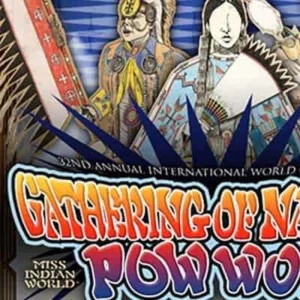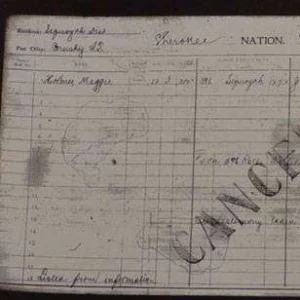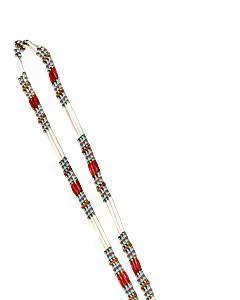How persuasive is the argument that indigenous and specifically Haudenosaunee political thought influenced the Founders of the United States? What level of non-Indigenous influences, if any, are seen in American political thought?
In answering how persuasive is the argument that indigenous peoples influenced American political thought, one must examine the evidence presented by authors Donald A. Grinde and Bruce E. Johansen in the work Exemplar of Liberty: Native America and the Evolution of Democracy.
In Chapter 4 of Exemplar of Liberty Grinde and Johansen demonstrate how many European philosophers of the Enlightenment were influenced by colonial records describing indigenous democracies of the Native Americans. Thinkers such as Rousseau, Montesquieu, Voltaire, and Montaigne are known to have influenced both the French and American Revolutions (Grinde, Johansen 72). Since each of these thinkers was informed at least in part by colonial descriptions of indigenous Native American democracies, it may therefore be reasonable to conclude that indigenous peoples influenced American political thought as translated by these philosophers (Grinde, Johansen 72). In Chapter 6 of Exemplar, the argument is presented that indigenous Native American philosophers had a more direct influence on the founders.
For example, the Iroquois were urging the colonists to form a confederation of their colonies as early as the Treaty Council of Lancaster in 1744 (Grinde, Johansen 93). In addition, Benjamin Franklin, a key American revolutionary thinker, is shown to have been profoundly influenced by the political thought of the Iroquois in both his public and private correspondence (Grinde, Johansen 98). There were also 200 Indians present at the Albany Conference in 1754 (Grinde, Johansen 105) resulting in the Albany Plan of Union. The Albany Plan influenced the Articles of Confederation, at which time many Iroquois delegates were also present while the plan for the independence of the colonies was being debated (Grinde, Johansen 145). Both of these documents to some degree or another informed the United States Constitution produced in 1787 (Grinde, Johansen 148). Once the Constitution had been adopted, John Adams wrote a passionate defense of the document and discussed the Iroquois political model throughout. According to Madison, another Founding Father, Adams’ book was very influential among the Founders of the American republic (Grinde, Johansen 200). Because of the documented presence of indigenous Native American leaders, as well as the documented speeches given by these same leaders at each stage in the development of the United States Constitution, it may therefore be reasonable to conclude that indigenous Native American leaders had a profound influence on the development of early American conceptions of democracy and representative government.
So we can see that Native America had a profound effect on American Politics and Government. But if so America obvious did not just follow these concepts of Native America as we can see in the history of the United States. Therefore what level of influence did non-Indigenous thinkers have on the American Founders? One must consider the information on European political thought that influenced Europeans before they came to America.
European political thinkers can be understood as follows:
Socrates is said to have favored direct democracy as he observed in Athens and he believed that one should do the right thing. His student Plato was against direct democracy and believed that society should be ruled by the “best.” In Plato’s view there should be an elite class of intellectuals. Both Plato and Aristotle are said to have favored public education. Aristotle is said to have believed in the importance of a middle class and that his ideas concerning a “polity” may be argued to be an early form of constitutional government. While Plato was an early feminist, Aristotle seems to have believed in the inherent inferiority of women. Aristotle is said to have favored a kind of government that was a mix of oligarchy, democracy and aristocracy. The early Church Fathers such as Augustine and St. Thomas Aquinas contributed ideas like the “golden rule,” but also the idea that “God is on Our side” and therefore “…we do not have to play by the same rules.” It is argued that the American Founders may also have been influenced by the Machiavellian principle that “the end justifies the means,” which is understood to mean one must give up some personal freedoms for the greater good. Hobbes is said to have contributed the idea that all individuals are selfish and therefore should act in their own enlightened self-interest. Madison and John Locke are said to have been the most influential non-Indigenous thinkers, contributing mainly the concept of private property ownership as well as both being anti-monarchists. Rousseau favored direct democracy and is said to have had a profound influence on left wing American thinkers like Jefferson. The Socratic principle of doing the right thing can be found in the American tradition, for example abolitionists who helped slaves escape on the Underground Railroad. Plato’s ideas of society being ruled by elites might be likened to the disproportionate influence of the wealthy in American politics. Both Plato’s and Aristotle’s ideas about public education can be seen in the fact that the United States has had a public education system for quite some time (Roundtable, Inc. 2001). Unfortunately Plato’s early feminism has been foreshadowed by Aristotle’s assertion of women’s inherent inferiority. Aristotle might well have thought that the American system, it may be said, is the kind of mix he favored with the legislature being aristocratic (Senate), democratic (House) and the judiciary being oligarchic. The presidency may be argued to fit in any of those categories depending on the time and circumstances. The Church Fathers ideas of doing unto others can be claimed to have been greatly foreshadowed by the notion that “God is on Our Side” and therefore “…we do not have to play by the same rules.” The legal fiction known as the “Doctrine of Discovery” which allows a “discovering” European Christian sovereign to deprive indigenous peoples of their lands without compensation is arguably an example of this. Therefore, James Madison’s and John Locke’s emphasis on the importance of private property ownership further developed this philosophy resulting in the theft of two entire continents from its indigenous Native American caretakers. The Hobbesian principle that all individuals are inherently selfish, is not found in indigenous Native American philosophies, but debatably may be seen in the territorial expansion of the United States, Machiavelli may likely concur. The lack of direct democracy in the American system, it may be argued, shows that the influence of thinkers like Rouseau, at least in that respect, was minimal. The lack of participation by women inherent in some misogynistic European philosophies shows that, at least in this respect, that Euro-Americans of the Revolutionary Era did not draw inspiration from indigenous Native American societies in which women were equals to men. One may therefore reasonably conclude that the Founders of the American Republic were also greatly informed by non-Indigenous philosophies and created a system that, at least in some respects, is quite contrary to indigenous Native American political thought.
The American Revolution can be disputed from the British perspective that the American Revolutionary War was fought by elites in the colonies pursuing their own economic self-interest. It may be reasoned that an elite class used a lot of the rhetoric of revolution to influence the general population to fight in the American Revolutionary War, but that their participation did not result in the liberties promised. This is well seen in the many broken promises made to the Native American Allies by the American Colonists. This argument is also persuasive in that women had no rights in the colonies, and the only persons with any real rights were white, property owning males. Slavery was widespread and moreover, it may be discussed that there is a paradox one can see in how indigenous Native Peoples were praised on the one hand and deprived of their liberties on the other.
For instance, in both Chapters 7 and 9 of Exemplar one sees Euro-Americans imitating indigenous peoples in the form of “Mohawk” protestors and as members of the “Tammany” society. While these early colonists may well have admired indigenous Native American societies and felt their imitation of indigenous Native American Peoples to be a form of “honor,” the indigenous perspective is a little different. In modern times this type of imitation is seen as quite offensive in the form of sports team mascots, corporate logos, and Boy Scout “powwows” where non-indigenous peoples misappropriate important cultural symbols and create a mythical “Indian” identity, supposedly as a form of honor (American Psychological Association 2005). It may be said that this phenomenon got started rather early. Through the creation of a pseudo-indigenous identity the Euro-Americans were trying to assert their rights to the continent and the original caretakers of the continent were given the choices of either extermination through warfare or through assimilation. The pseudo-indigenous identities just mentioned may be explored to be a part of the assimilative tradition.
While it is true that some members of the Revolutionary Generation such as Franklin and Jefferson do seem to have admired indigenous Native American democracies (Grinde, Johansen 159, 160), it may also be argued that these same men acted in their own self-interest to the detriment of indigenous peoples. For example, while many are familiar with the line in Jefferson’s Declaration of Independence saying “all men are created equal…,” most are not familiar with the line that condemns indigenous peoples as “merciless Indian savages…” (Independence Hall Association 1999-2011) or that during Jefferson’s Presidency the Lewis and Clark expedition was basically espionage against the indigenous populations to determine what tactics would be most useful in warfare against them to deprive them of their lands. A generation earlier Washington wrote in a letter to William Crawford to survey land beyond the Proclamation line of 1763 that had been created to protect the lands of Indians from European colonists (Getches, Wilkinson, Williams 59). Even Benjamin Franklin was a shareholder in the Indiana Company, a land speculating company that surveyed Indian lands with the intention of eventually depriving them of it. (Getches, Wilkinson, Williams 61). While it may be understood that this paradox is not the thesis of Exemplar, it may be argued that it is important to understand how a society influenced so greatly by indigenous peoples could have resulted in the near total annihilation of the peoples by whom it had been inspired.
In conclusion, one may reasonably argue that the influence of indigenous Native Peoples on the development of democracy and the founding of the United States is true. In addition, it may be reasonable to conclude from American society in different periods in history that non-indigenous influences also informed the development of the United States. One may also reasonably conclude from the lack of direct democracy and the disproportionate influence of the wealthy in much of American history that the British perspective of American Political thought is persuasive.
Bibliography:
Books:
1. Exemplar of liberty: Native America and the Evolution of Democracy
Donald A. Grinde & Bruce E. Johansen. American Indian Studies Center, Univ. of California. 2008
2. Federal Indian Law 5th Edition
David H. Getches, Charles F. Wilkinson & Robert A. Williams, Jr. Thomson/West. 2005
Online:
3. “American Indian Mascots.” American Psychological Association (APA). Web. 30 Jan. 2011. <http://www.apa.org/pi/oema/resources/indian-mascots.aspx>
4. “SCHOOL: The Story of American Public Education.” PBS: Public Broadcasting Service. Web. 30 Jan. 2011. <http://www.pbs.org/kcet/publicschool/>
5. “The Declaration of Independence.” Ushistory.org. Web. 30 Jan. 2011. <http://www.ushistory.org/declaration/document/>
Last Updated on December 13, 2023 by Paul G





bearcat
says:The complete book “Exemplar of liberty: Native America and the Evolution of Democracy” can be found online at ===>
http://www.ratical.org/many_worlds/6Nations/EoL/index.html#ToC
Enjoy.
thunder wolf (ed van natta
says:read this was cool like very much of friend to read this